Iran's Red Crescent Society Says It Has No Plans To Import Pfizer Vaccines
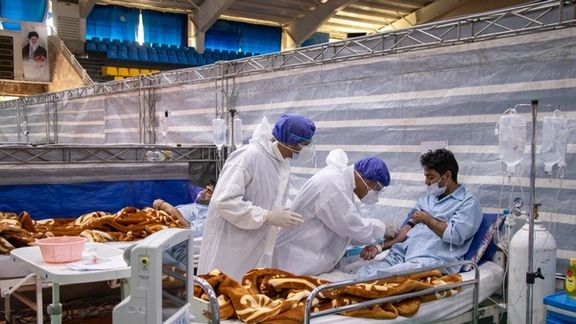
An Iranian official has reiterated on Saturday that there are no plans to import Pfizer Covid vaccines, despite an earlier announcement.

An Iranian official has reiterated on Saturday that there are no plans to import Pfizer Covid vaccines, despite an earlier announcement.
Mohammad Hassan Qousian Moghaddam, spokesman for the Red Crescent Society, said the organization had no plans to import the Pfizer vaccine.
In September Iran announced that it would import two million doses of the vaccine produced in Belgium for pregnant women, but the health ministry backtracked on September 26, cancelling the decision.
Iran's Supreme Leader Ali Khamenei banned the purchase of American and British Covid vaccines in January, which led to a costly delay in vaccinations. His decision was based on political reasons and conspiracy theories that the US and the UK might try to alter the "Iranian gene".
A fifth wave of the pandemic hit Iran hard in July and August causing tens of thousands of additional deaths. In recent weeks imports of Chinese vaccines have been accelerated.
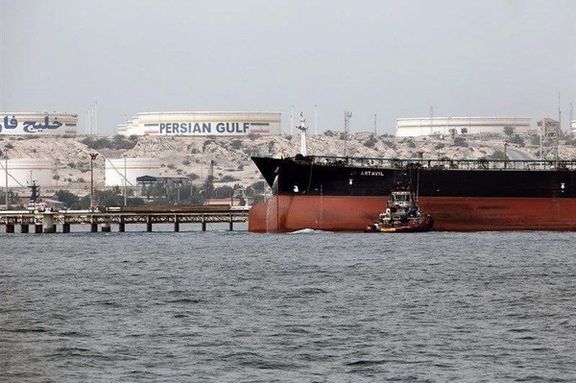
The third Iranian tanker carrying fuel for Hezbollah in Lebanon, has reappeared on a satellite tracking system in the Gulf of Suez, TankerTrackers has reported.
The tanker Fortune has been identified through the Automatic Identification System (AIS) that uses transceivers on ships and is used by vessel traffic services. TankerTruckers.com tweeted the news on Friday.
The Lebanese Hezbollah announced in August that Iran will be sending diesel and gasoil to energy-starved Lebanon, in a challenge to the United States that has sanctioned both Iran and Hezbollah.
The first tanker anchored at the Syrian port of Baniyas and some of its fuel has already been shipped to Lebanon by tanker trucks.
While Hezbollah insists that the some of the fuel will be distributed among hospitals and other public services, the rest will be sold. This would generate money for the Shiite militant organization, which has always depended on Iran for financial support.
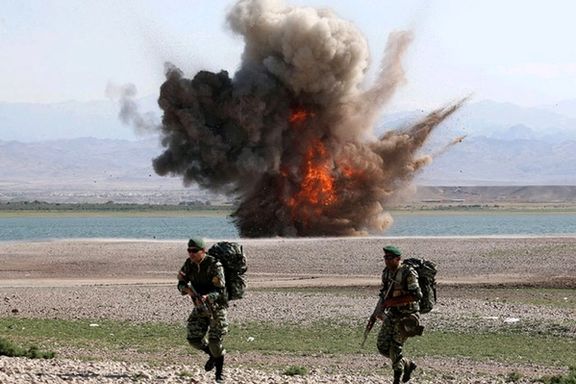
Iran-Azerbaijan tension grew Friday as Iranian officials continued to criticize Baku’s links with Israel as the Iran military conducted exercises near the Azeri border.
In an interview on the side-lines of the maneuvers, Brigadier-General Kiumars Heidari said Iran would not tolerate any change in Armenia’s borders. Some weeks ago Azerbaijan arrested Iranian truck drivers using a land corridor that emerged from the Azerbaijan-Armenia war of 2020 when Azerbaijan acquired Nagorno-Karabakh.
Tehran was also alarmed at Azerbaijan’s military drills with Turkey and Pakistan beginning September 12 in Baku, about 250km from the Iranian border.
Abdollah Ganji, managing director of Javan newspaper, which is affiliated to the Revolutionary Guards (IRGC), in a tweet Friday alluded to Azerbaijan being historically Iranian territory. He said Iran had "showed respect and recognized the rulers of Azerbaijan" but warned that they should not use "borrowed power to threaten" Iran.
People living on the two sides of the Aras River, which separates Iran and Azerbaijan, "have had Iranian identity for several thousand years," Ganji continued. The territory was acquired by the Russian empire from the Qajar dynasty after the Russo-Persian War of 1826-28, dividing Azeri speakers between northwest Iran and the Russian empire.
Iran is particularly concerned at Azerbaijan in recent years moving closer to Israel, which is a major oil customer and reportedly allowed to use Azerbaijan’s airbases.
Attending the Iranian military exercises, Mohammad-Ali Ale-Hashem, Supreme Leader Ali Khamenei's representative to the northwestern province of Ardabil, accused Israel of "seeking to create disruption and tension in good relations between Muslim countries."
Interior Minister Ahmad Vahidi said Thursday evening during a visit to the northwestern province of Ardabil that Israel and the "enemies of the friendship between Iran and Azerbaijan" had been trying to sabotage their relations.
Iran's ambassador to Azerbaijan, Seyed-Abbas Mousavi, took to Twitter Friday to respond to the Israeli ambassador's tweet claiming that unlike Iran, Israel, the United States and Azerbaijan invested in "diversity and tolerance."
"We have special respect for all Jews, Christians and other followers of the divine religions, " Mousavi tweeted. “But we are sure that the Republic of Azerbaijan and Palestine will remain Islamic countries forever. The dreams of Zionism for this region will never be interpreted.”
In an interview with Anadolou, a Turkish state news agency, published Monday, the first anniversary of the 2020 war, the president of Azerbaijan, Ilham Aliyev, said he was "very surprised" that Iran was holding military exercises in a border region and questioned whether they were linked to Azerbaijan acquisition of territory from Armenia.
Many border issues between Azerbaijan and Armenia remain unresolved, and there have been intermittent clashes since May.
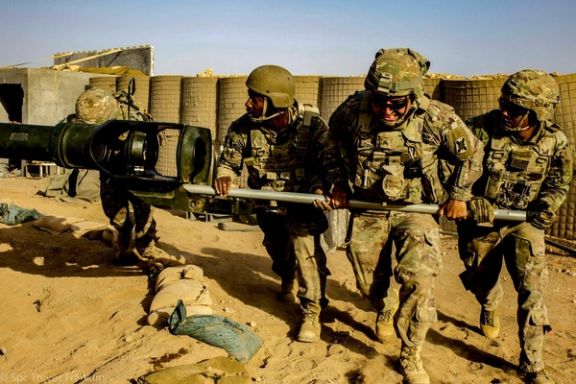
A recent pledge by US president Joe Biden that the US would not abandon Kurdish allies in Syria has gone a long way to allay their fears, according to Reuters.
In meetings held in August and September between US officials and the Kurdish-led Syrian Democratic Forces (SDF), Biden’s pledge was conveyed to the Kurds who have played a pivotal role in the fight against the Islamic State group. They are supported by around 2,000 US troops stationed in Syria.
The US military presence in Syria is also needed to curb Iran’s influence in both Iraq and Syria and address the security concerns many US allies – particularly Israel – in the region feel as a result.
The hasty and badly organized US withdrawal from Afghanistan in August prompted fears among Washington’s other allies about the durability of US friendship. Kurdish troops in northeastern Syria, facing multi-pronged opposition from Islamic State fighters as well as the Assad regime and the prospect of Turkish incursion, have felt particularly vulnerable.
The election of Joe Biden in November 2020 raised the hopes that the US would adopt a steadier approach in its dealings with the Kurds in Syria. And it seems that, on appearances at least, the US is willing to do so.
Reporting by Reuters

Iran’s Supreme Leader Ali Khamenei’s personal physician Alireza Marandi has told the health minister criticizing plans to hold a “vaccine victory” celebration.
Marandi, who is also Khamenei's medical advisor, in a letter to the health minister has warned that such a mentality "oversimplifies" the Covid-19 pandemic.
Iran’s Supreme Leader Ali Khamenei’s personal physician and medical advisor Alireza Marandi has written to the health minister criticizing plans to hold a “vaccine victory” celebration, saying such a move is oversimplifying the health crisis.
Health Minister Bahram Einollahi said earlier this week that the country would hold celebrations to mark “vaccine victory”. Iran started Covid-19 vaccination late and stayed behind many other regional countries such as Turkey, the United Arab Emirates and Saudi Arabia.
As a severe new wave of infections and deaths hit the country in July and August, imports of Chinese vaccines picked up speed and more than 55 million doses have been administered among Iran’s 85-million population.
However, the main reason for the slow start to vaccination was Khamenei’s ban in January to import American and British vaccines, largely on political grounds and based on conspiracy theories. The leader’s personal doctor was among those who early on backed the vaccine ban.
Marandi has told the health minister that premature celebrations can lead to loss of trust among the populace regarding government decisions and actions.
Iran has so far fully vaccinated around 30 percent of its population, although political leaders try to claim that close to 70 percent are vaccinated, by counting those who have received only the first dose.
More than 120,000 Iranians have died according to official government figures that are hotly contested by medical experts and some politicians in the country. There have been estimates that the real figure might be 2-3 times higher that what the health ministry says.
Marandi in his letter has warned the health minister not to make optimistic promises of freedom to travel once vaccination reaches 70 percent. He said such moves could lead to new pandemic surges, taking more lives.
The change in tone of Khamenei’s personal doctor could signal the possibility that Supreme Leader learned a lesson from underestimating the pandemic earlier on and besides his vaccine ban, allowing crowded religious ceremonies to take place.
Another major mistake by Khamenei’s office was to promise the development of homegrown vaccines, despite warnings that this would be a very ambitious undertaking.
According to some claims, the government gave hundreds of millions of dollars to powerful regime insiders to develop half a dozen Covid vaccines, and so all these efforts have essentially failed. This has led to public criticism and even ridicule, a fact implicitly reflected in Marandi’s letter.
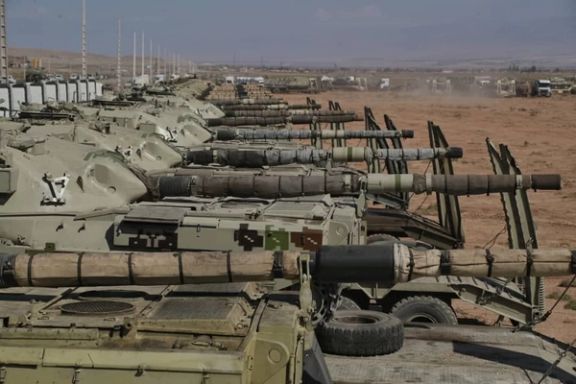
The commander of the Iranian army's ground forces says the Islamic Republic will not tolerate any change in the official borders close to the Iranian territory.
Brigadier General Kiumars Heidari’s remarks in an interview with the official news agency IRNA, came as a major Iranian military exercise started along Iran's borders with the Republic of Azerbaijan on Friday and videos and photos posted on social media show massive deployment of Iranian forces and military equipment to the region.
Heidari said: "There are unwanted elements in our region who wish to destabilize the region and undermine its security." He added: "We have been more sensitive about developments at our borders since Israeli elements have arrived in our region. We are monitoring their activity."
Last year when the war over Nagorno Karabakh took place between Azerbaijan and Armenia, Iranian officials and military commanders said that there were Israeli elements in the region and that Azerbaijan and Turkey had positioned Syrian jihadist militia in an area close to Iranian borders.
The Iranian commander reiterated, "We have still not been convinced that the terrorists who have come to the region from Syria have left this region," while also insisting that "Iran is sensitive to changes to official borders in its vicinity and cannot accept them."

In a clear reference to Armenia, which was defeated in the 2020 war, Heidari said, "A possible weakness in one country to protect its borders gives no reason to other countries to change the borders. The Islamic Republic will not allow that.” There have been recent signs of Azerbaijan flexing its muscle in the narrow strip of Armenia’s southern province that connects Iran with Armenia, Georgia and beyond to the north.
General Heidari further said that the Iranian military exercise "aims to assess and promote the combat readiness of Iranian forces as there are several other military exercises going on in our neighborhood." He added: "There have been four or five exercises north of our borders during the past month and currently Turkey is also carrying out another military drill near our northern borders."
Heidari, however, insisted that Iran has never attacked any country during the past two centuries, and that Iran has stressed on Azerbaijan's territorial integrity while Karabakh was under Armenian occupation.
He insisted that transit journeys in the region should remain safe and secure and the transit routes for trade and energy transfer should be respected by regional countries. He was obviously alluding to the obstruction o Iranian trackers transit journey by Azerbaijan during the past months.
In the meantime, exchanges between social media users from Iran and Azerbaijan have continued during the past 24 hours. A tweet asking Iranian Twitter users whether they would go to war with Azerbaijan if such a war breaks out was "liked" by nearly 600 users, retweeted around 20 times and some 200 users responded that they would go to war with Azerbaijan within a few hours of posting the tweet.
Twitter account Azariha quoted Azbarjani lawmaker Fazil Aghamali as having said that Azerbaijan is capable of responding to a possible Iranian attack. The account answered that it appears that the Azeris have forgotten that the Iranian exercise started as a reaction to a trilateral exercise by Azerbaijan, Turkey and Pakistan in the region and that the Republic of Azerbaijan has violated the Caspian legal regime by extending that exercise into the Caspian Sea.
On September 30, the Twitter account Chamroush posted a video showing Iranian forces rehearsing part of the military exercise by shelling hills at the border area.
Meanwhile, Iranian lawmakers also responded to threats from Azerbaijan on Twitter. Jalal Rashidi Koochi, an MP for Marvadasht and Pasargadae wrote: "There is a limit to Iran's patience. Every bullet shot at Iran will be responded to by firing a missile at those who shoot the bullet as well as other missiles fired at Haifa, Tel Aviv and other Israeli cities."
Mohsen Dehnavi, MP for Tehran wrote in a tweet: "America and Israel have pushed Azeri leader Elham Aliyev into a dangerous scenario in order to create geopolitical changes against Iran and Russia. The heart of 6 million Shiites in the Republic of Azerbaijan pounds for Iran!"
In the Iranian press last week, the only anti-Azeri comment was observed in the Kayhan daily, close to the office of Supreme Leader Ali Khamenei. Kayhan wrote: "Iran will not tolerate changes at its northern borders which are aimed at undermining the interests of Iran and Russia." While pointing the sharp end of its analysis on the Republic of Azerbaijan, Kayhan also attacked Armenia and accused President Nikol Pashinyan of an act of reason against Armenia by accepting a Turkish-US plot."